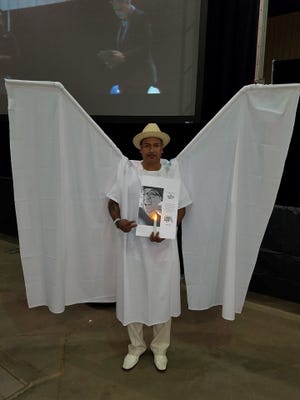
COVID-19 cases among American children are growing at record-high levels.
For the week ending Dec. 23, almost 199,000 child COVID-19 cases were reported, a 50% increase over weekly new cases from the beginning of December, according to the American Academy of Pediatrics.
Children represented 20.8% of all COVID-19 cases during that week, the academy said.
Children are also being hospitalized at record-high rates. During the week of Dec. 22 to Dec. 28, an average of 378 children age 17 and under were admitted per day to hospitals with the coronavirus, a 66% increase from the week before, the Centers for Disease Control and Prevention reported last Thursday.
The previous high over the course of the pandemic was in early September, when child hospitalizations averaged 342 per day, the CDC said.
Two months after vaccinations were approved for 5- to 11-year-olds, only about 14% are fully protected, CDC data shows. The rate is higher for 12- to 17-year-olds, at about 53%.
The Food and Drug Administration is reportedly poised to authorize a third dose of the Pfizer-BioNTech coronavirus vaccine for kids ages 12 to 15.
Regulators also plan to allow adolescents and adults to get the third shots five months after receiving the second dose of the Pfizer’s vaccine instead of the current six months, The New York Times reported, citing sources it described as familiar with the agency's deliberations. The Times reported that the authorization is expected Monday.
Also in the news:
►Israel will offer a fourth COVID-19 vaccine shot to people aged 60 or older and medical workers, Prime Minister Naftali Bennett said Sunday.
►Over 10,000 flights entering, leaving, or flying within the U.S. on Sunday were delayed or canceled, according to the tracking service FlightAware, as COVID-19 continues to fuel staffing issues on top of winter weather.
📈 Today's numbers: The U.S. has recorded more than 55 million confirmed COVID-19 cases and more than 826,000 deaths, according to Johns Hopkins University data. Global totals: More than 290 million cases and 5.4 million deaths. More than 205.8 million Americans — 62% — are fully vaccinated, according to the CDC.
📘 What we're reading: Transgender adults are having a much more difficult time than the overall population in getting adequate nourishment during the COVID-19 pandemic, according to a new study. The gap was even more severe for transgender people of color, who were six times as likely to experience food insufficiency as cisgender white adults. USA TODAY's Keveney writes.
Keep refreshing this page for the latest news. Want more? Sign up for USA TODAY's free Coronavirus Watch newsletter to receive updates directly to your inbox and join our Facebook group.
Secretary of Defense tests positive for COVID-19
U.S. Defense Secretary Lloyd Austin has tested positive for COVID-19 after exhibiting symptoms while at home on leave, he announced on Twitter Sunday night.
"I will quarantine myself at home for the next five days," said Austin, adding: "I plan to attend virtually this coming week those key meetings and discussions required to inform my situational awareness and decision making."
His last meeting with President Joe Biden was Dec. 21, Austin said, and he tested negative that morning. Austin said he hasn't been in the Pentagon since Thursday.
Austin, 68, said he was fully vaccinated and received a booster in October.
“The vaccines work and will remain a military medical requirement for our workforce. I continue to encourage everyone eligible for a booster shot to get one. This remains a readiness issue,” he said.
— Celina Tebor, USA TODAY
Tested positive for COVID during the holidays? Here's what to do.
Testing positive for COVID-19 starts a confusing, disruptive and at times frightening process – one that millions of Americans will likely go through in the coming weeks.
First, you need to isolate. That’s a more intense version of quarantining – it means cutting off contact with other people as much as possible so you reduce the chance of infecting them. This also means forgoing travel, not going to work and even limiting contact with people in your own household who aren't infected.
The CDC says isolating is a necessary step whether you’re vaccinated or unvaccinated, and whether you have symptoms or feel fine.
Everyone who tests positive for COVID-19 should monitor their symptoms. And people who are unvaccinated or at high risk for severe disease should be extra-vigilant for symptoms that might require emergency care. Call your doctor for early treatment options.
The CDC in late December shortened the time it recommends people isolate, saying "People with COVID-19 should isolate for 5 days and if they are asymptomatic or their symptoms are resolving (without fever for 24 hours), follow that by 5 days of wearing a mask when around others."
Read the CDC's updated guidance on isolating and quarantining.
Contributing: Mike Stucka, USA TODAY; The Associated Press









